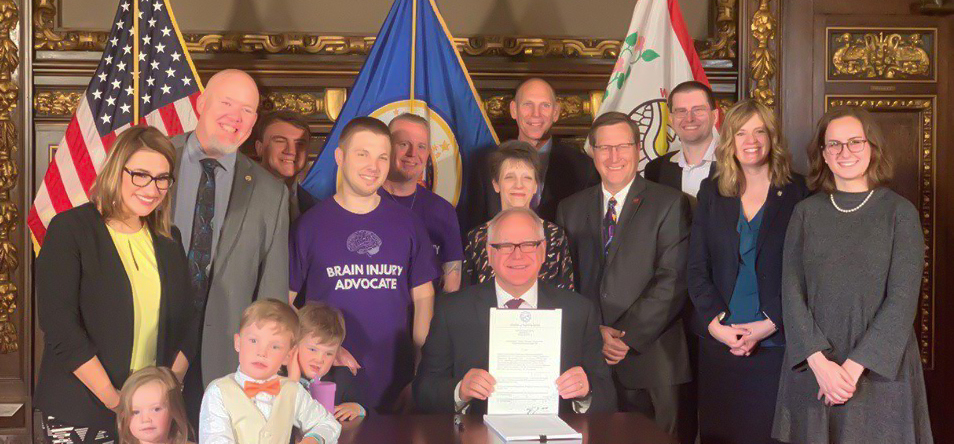
At the end of 2020 we welcomed Mollie Clark to our team to fill the newly created Advocacy and Public Policy Manager position. In addition to meeting with legislators at the Minnesota State Capitol and advocating for policy important to the epilepsy community, she also works with advocates like you to connect you with legislators and make sure your story is heard.
Below we asked Mollie some questions about her passion for advocacy and what she’s looking forward to doing with the epilepsy community.
Q: When did you first get involved in advocacy?
MC: When I was in high school I joined the debate team, hoping to overcome my fear of public speaking. As a professional in the public policy world, I think it’s safe to say that it worked. Debate helped me discover a love for policy, research, and social justice that transitioned perfectly into advocacy at the Minnesota State Capitol.
Q: Why did you decide to work in the public policy and advocacy arena?
MC: My undergraduate degree was in Law, Politics, and Society which was an interdisciplinary major that combined elements of political science, legal studies, and sociology — that’s a complicated way of saying that we studied gaps in systems.
I spent a lot of time thinking about places where people in their daily lives weren’t being served by the laws passed by the governments that were supposed to serve them. I view public policy and advocacy as how we close those gaps. I am drawn to this work because, while politics often gets a bad reputation, policy-making is actually inherently hopeful. This process lets us reimagine the world we live in, share our stories, and change it for the better.
Q: What policy work did you do before coming to EFMN?
MC: My first policy job was working at the Harkin Institute for Public Policy and Citizen Engagement in Des Moines, Iowa. Working under Senator Tom Harkin (Ret) I saw first-hand the impact of the Americans with Disabilities Act and the way it fundamentally shaped disability policy in the US.
In 2018, I moved back to my hometown and began working at the Minnesota Brain Injury Alliance as a Public Policy Associate. During my three years at MNBIA I was able to organize brain injury survivors to share their diverse and complex stories at the capitol. Our advocacy resulted in the passage of numerous bills to prevent injuries, improve access to healthcare, expand transit options, and promote a greater understanding of disability rights. I am so excited to bring this experience in grassroots organizing to the Epilepsy Foundation of Minnesota and to be a part of shaping a vibrant, enthusiastic, and diverse community of advocates.
Q: Can you share one of your favorite advocacy moments?
MC: The absolute highlight of my work in advocacy was in 2019 working on a bill called Mitchell’s law, named after the brain injury advocate who came up with the idea. After a severe car accident that left him in a coma, it took almost 10 hours for emergency responders and hospital personnel to contact Mitchell’s loved ones. From this deeply personal experience, Mitchell was able to work on a legislative solution that would allow individuals to add emergency contact information to their driver’s license or state ID.
After months of meetings, testimony, and rallies, the bill passed and was signed into law, helping ensure that loved ones are connected during times of crisis. This experience emphasized to me how powerful advocacy can be. It is only by engaging our vibrant communities that we can bring that power — of truly representing real people, real stories, and real lives — to policy.
Q: What are you looking forward to over the next year?
MC: I wish I could share with you the whiteboard by my desk! It’s a revealing picture of the hopes I have for my first year here, a web of bubbles connecting advocacy training and new bill ideas with our upcoming Day at the Capitol and broad dreams for building a program that is as diverse as the communities we serve. I am excited to dig into these big plans and to do the work that I love in an organization that is truly mission-driven.
Even more importantly, I can’t wait to meet you! The people whose lives are touched by epilepsy in many forms, who know that there is a future where people are uplifted by the systems around them, and who are bravely sharing their stories to make Minnesota a better place for people with epilepsy.
Q: What advice do you have for a first-time advocate?
MC: Three things come to mind that I think a new advocate, or someone thinking about becoming an advocate, should know.
- You are not alone. When you join us to advocate, you join a community of professionals and people with epilepsy who are here to support you. While the political world may not always feel welcoming, we are here to make the Minnesota State Capitol a welcoming place for you so that you have the space to make your own mark on the policies affecting your community.
- You don’t need to be perfect. Many people expect that they have to be a policy expert to make an impact. That couldn’t be further from the truth. You, the way you are, are ready to be an advocate because you are an expert on your own story. Your experience with epilepsy gives lawmakers key insights into the way that the laws they write affect real Minnesotans.
- You are powerful. Lawmakers prioritize their constituents because you help decide whether they win or lose their election. When you meet with the person who represents you, you have the power to give them suggestions that benefit the community, ask them to support good bills, or even guide them away from bad ideas. Your voice is powerful!
